Building Resilience through Mental Health and Empathy
It is essential to tend to one another’s mental health and foster empathy as we collectively navigate grief, healing, and recovery in our communities. ALLMEP is sharing resources on how we support one another through these difficult periods, and recently spoke with Dr. Ahmad Abu Al-Halaweh about how to prioritize mental health during this period.
- 🌟 Empathy as a Natural Resource
Empathy is a cornerstone of conflict transformation. It allows individuals to understand and appreciate the perspectives, thoughts, and emotions of others, facilitating the resolution of disputes and the creation of a better society. Empathy serves as a counterforce to aggression and conflict, promoting prosocial behavior, and has the potential to establish sustainable peace among communities in conflict.
- 🌟 What is Empathy?
Empathy is the capacity to recognize other people’s thoughts and feelings (cognitive empathy) and to respond to them with appropriate emotions (affective empathy). This dual aspect of empathy is vital for understanding the emotions and experiences of others, thus creating a bridge of understanding and compassion.
- 🌟 What Makes Us Less Empathic?
Numerous factors, both social and biological, can reduce a person’s level of empathy. Social factors include obedience to authority, strong ideological beliefs, in-group/out-group relations, early neglect and abuse, and traumatic experiences. Biological factors may include genetics and hormonal influences, such as testosterone and oxytocin.
- 🌟 How to Foster Greater Empathy as a Natural Resource
Efforts to foster empathy can have a significant impact on mitigating and transforming conflicts. Inter-group interactions between conflicting communities can help reduce fear and tension, provided specific conditions are met. These conditions include equal status, common goals, and the authorization of intergroup contact by relevant authorities. Such interactions, even if they don’t immediately lead to empathy, often lead to a reduction in hostility.
- 🌟Power Dynamics and Empathy
The dynamics of power between conflicting groups can have a substantial impact on the course of the conflict. Maintaining asymmetric control over resources can perpetuate the conflict. To foster effective empathy, addressing power differentials is essential. Truth and reconciliation processes, the removal of constraints on liberty, power-sharing arrangements, and instilling a culture of empathy in children are all ways to promote empathy and peace in the face of power imbalances.
Guiding Principles for Supporting Each Other in Tragedy
In addition to fostering and sustaining empathy, we present below several guiding principles for supporting one another during times of tragedy:
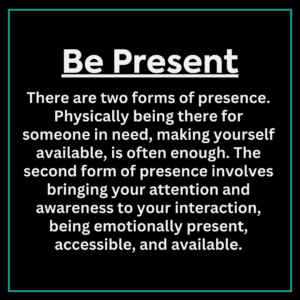
🤝 Be Present
Being present is the first and most fundamental principle to support one another in times of tragedy. There are two forms of presence: physical and emotional. Physically being there for someone in need, making yourself accessible and available, is often enough. The second form of presence involves actively bringing your attention and awareness to your interactions in the present moment. It means being emotionally present, accessible, and available. It’s important to acknowledge that being present can be overwhelming during times of tragedy, so it’s essential to modulate your presence to a level that feels safe and tolerable for both you and the person you’re trying to support.
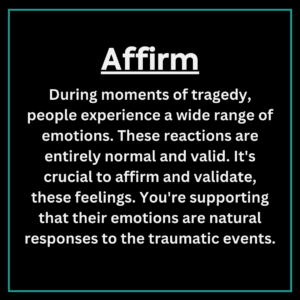
🙌 Affirm
During moments of tragedy, people experience a wide range of emotions, including sadness, grief, fear, guilt, anger, numbness, and more. These reactions are entirely normal and valid. It’s crucial to affirm, validate, and normalize these feelings. Remind those you’re supporting that their emotions are natural responses to the traumatic events they’ve witnessed. They are signs of their humanity and emotional health, not weaknesses.
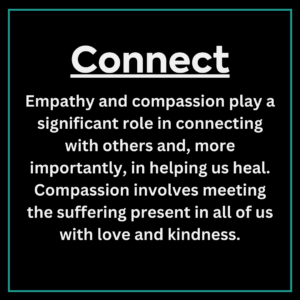
🫂 Connect with Compassion
Empathy and compassion play a significant role in connecting with others and, more importantly, in helping us heal. Compassion involves meeting the suffering present in all of us with love and kindness. By sharing the pain and connecting empathically, compassion naturally emerges. This is essential because giving and receiving compassion is healing – it’s one of the most potent and powerful forms of human medicine. Remember that we all have the innate capacity for compassion, and it can be a powerful tool for recovery.
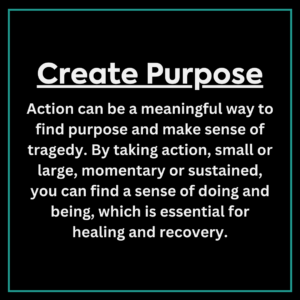
🌱 Create Purpose Through Action
Action can be a meaningful way to find purpose and make sense of tragedy. There are two forms of action. First, consider actions that align with your personal values and contribute to the well-being of others, such as volunteering or providing emotional support to friends and family. Second, engage in simple actions for the sake of being an active agent in your own life. This might involve establishing a routine, like taking a walk, eating regular meals, or engaging in self-care practices. By taking action, small or large, momentary or sustained, you can find a sense of doing and being, which is essential for healing and recovery.
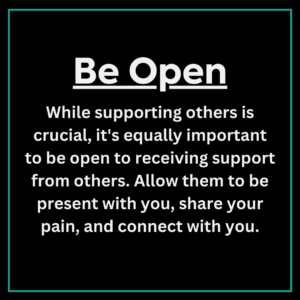
🔄 Be Willing to Receive
While supporting others is crucial, it’s equally important to be open to receiving support from others. Allow them to be present with you, share your pain, and connect with you. It can be challenging to maintain a support role if you are not willing to receive care and compassion in return. Just as we are naturally wired to give, we are also wired to receive. By choosing to be receptive, you enable a cycle of care and compassion to continue, helping both you and others in the healing process.
📚 Source: The resources in this blog post have been adapted from NGO Empathy for Peace’s white paper, “Empathy: An Invaluable Natural Resource for Peace” and a circular from Professor Amit Bernstein at the University of Haifa, “How We Support One Another in Tragedy: Five Principles”. With resources and support provided in conversation with Dr. Ahmad Abu-Akel, Professor of Psychopathology and Social Neuroscience.
